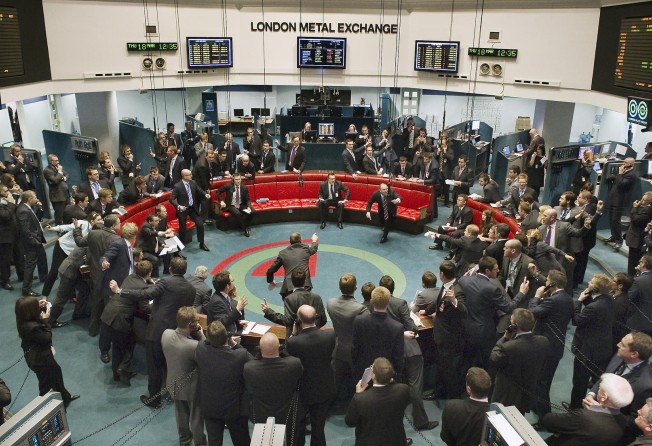Little progress seen so far in turning Hong Kong into a commodity trading centre
Absence of physical delivery mechanism and liquidity shortage seen holding back city's ambitions to compete with LME

Three years after the local exchange bought the London Metal Exchange, little progress has been made in turning Hong Kong into a commodity trading centre.
Hong Kong Exchanges and Clearing (HKEx) paid £1.39 billion (HK$16.9 billion) to buy the LME, but the city continues to lag Singapore and Japan in commodities trading and metal trading is still run in London where the trade shows no sign of moving.
The only gain from the purchase is in HKEx's bottom line. An increase in fees and the new LME clearing house has provided HKEx with HK$446 million in income, up 42 per cent from a year ago, accounting for 15.9 per cent of its total. The funds contributed to HKEx's first quarter profit of HK$1.58 billion, a rise of 34 per cent.
"There are some Hong Kong and mainland brokers who tried to start a commodities desk last year but the result is not very good," said Jeffrey Chan Lap-tak, chairman of Hong Kong Securities Association.
Chan said some brokers want to attract mainland metal users such as car makers or manufacturers to trade in Hong Kong commodity products after HKEx launched three metal contracts in December in aluminium, zinc and copper. But so far the average daily turnover in the first four months stood at only 287 contracts, the second least traded products in the exchange.
"According to some brokers, they reflect the view that mainland metal users want to have physical delivery as they need the metal for their production. But the three contracts traded in Hong Kong are cash only without physical delivery," Chan said.
The Hong Kong traded metal contracts need a physical delivery mechanism to attract users in China to trade in Hong Kong.
But the problem is that physical delivery means setting up warehouses for the metal, and that is a challenge given the LME already has a warehouse for copper in Singapore and aluminium warehouses in Japan.
"There needs to be a greater focus on the needs of the end user," said Clara Chan, vice-chairman and chief executive of Lee Kee Group and a member of the LME. "Commodities futures contracts were originally invented to help the physical users of metals hedge against price fluctuations," she said.
"There are many small metal users in China that want to access LME metal prices but lack the scale or resources to trade directly on the LME in London. "These companies are a natural customer base for the smaller sized LME-based contracts available in Hong Kong."
She hope to see a commodities through train between Hong Kong and mainland commodity exchanges similar to the tie up between the stock markets of Hong Kong and Shanghai that allow cross border trading.
"Expanding the through train to include commodities would make it easier for smaller metal users in China to access LME prices via Hong Kong and get a more competitive price," she said.
William Barkshire, managing director of markets consultancy firm Agora Partners, said Singapore is a key rival to Hong Kong and dislodging the Southeast Asian city-state will not be easy.
"Singapore has stolen a natural advantage as the major location for trading commodities given its position in shipping and oil which has also been helped by government subsidies and effective central planning," Barkshire said.
"They key challenge for Hong Kong is to develop products which are highly differentiated and based on regional and China pricing," he added.
He said Hong Kong would find it hard to compete with London in metals trading because of that city's deep liquidity.
"A real growth opportunity exists in the OTC traded options markets as these products are not yet readily available on the mainland and more closely match the risk management requirements of underlying real market users compared to futures," Barkshire said, adding that a commodities through train scheme would be helpful but hard to achieve.
"Whilst is not impossible, it is highly challenging given the different risk profiles for derivatives compared to cash equities," he said.
"An alternative might be to list mainland products in Hong Kong under licence agreements from the mainland exchanges or to jointly develop new products which could be offered in Hong Kong to international players and approved mainland entities."
Brett McGonegal, chief executive of financial services firm Reorient Group, said the HKEx would need more integration with LME such as developing a 24 hour trading platform for commodities.
"I don't see this as a successful tie up if these units are run on a standalone basis. HKEx has to figure out a way to scale the platform and use the LME as a basis for a larger fully integrated global outlet or else the deal will result in nothing more than a bunch of headlines and opportunity cost," McGonegal said.
"The tie up offers opportunity but that opportunity needs to be scaled into a new combined platform that people need to use. If the offer doesn't allow for an outsized result then investors will be happy to trade via the original trusted venue," he said.